Did the Romans Win in 55 BC?
£3.00
When Caesar landed in Britain in 55 BC the very first thing he did was to fight the Britons. This lesson explores the question that although the Romans weren’t defeated – did they actually win? Caesar certainly told Rome that he did. But between the weather and the Romans’ lack of cavalry the Britons might have had a different opinion.
As well as English (designing a poster) and history skills the Evidence-Based Learning skills developed in this lesson offer pupils the opportunity to master independent learning.
Description
Each evidence-based learning (EBL) Roman history resource in this set is a complete lesson which uses the history curriculum as a framework through which each of the eight EBL skills can be mastered. Each resource has “mastering” one EBL skill as its central focus and all eight EBL skills are covered more than once in these lessons.
All eight EBL skills are better gained working with a partner so much of the work in these lessons is collaborative. These resources will ensure that pupils can master and use EBL skills regardless of their ability.
Each Roman history lesson will develop a single EBL skill through:
1) A “Before You Start” page that introduces the EBL skill.
2) Opportunities to master this skill during the lesson.
3) An “After You Finish” page that offers pupils the chance to evaluate their learning experience (of the lesson and the EBL skill) and to identify their next step in using the EBL skill.
The skill in bold below is the EBL skill developed in this Roman lesson. Click on this skill to learn more about this skill.
- Collaboration
- Thinking Skills
- Peer Assessment
- Peer Teaching
- Self-Assessment
- Metacognition
- Self-Regulation
- Independent Learning
1 review for Did the Romans Win in 55 BC?
Only logged in customers who have purchased this product may leave a review.
Related products
-

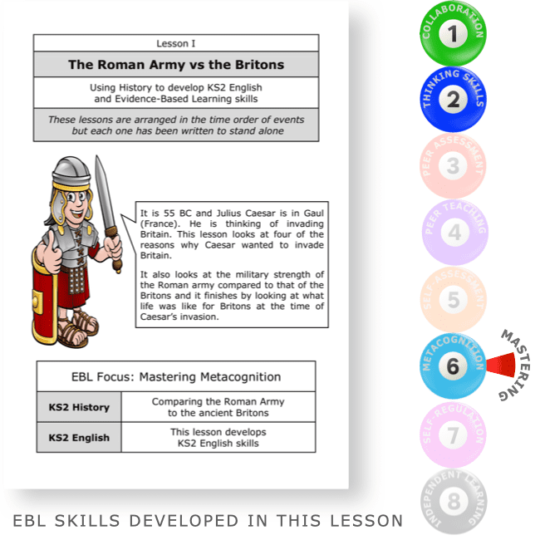
The Roman Army vs the Britons
£3.00 Add to basket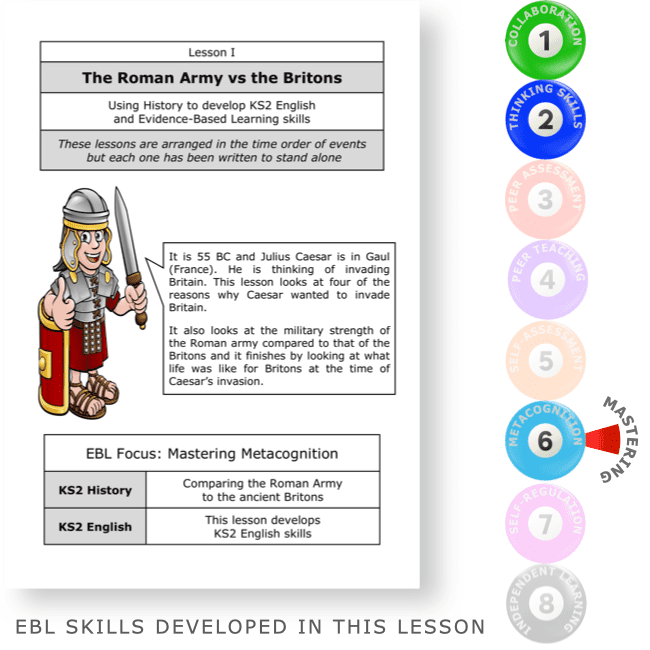 £3.00Add to basket
£3.00Add to basketIt is 55 BC and Julius Caesar is in Gaul (France). He is thinking of invading Britain. This lesson looks at four of the reasons why Caesar wanted to invade Britain. It also looks at the military strength of the Roman army compared to that of the Britons and it finishes by looking at what life was like for Britons at the time of Caesar’s invasion.
As well as English and history skills the Evidence-Based Learning skills developed in this lesson include collaborative learning and thinking skills. This lesson also offers pupils the opportunity to master metacognition.
VIEW -


Even More Problems for Caesar
£3.00 Add to basket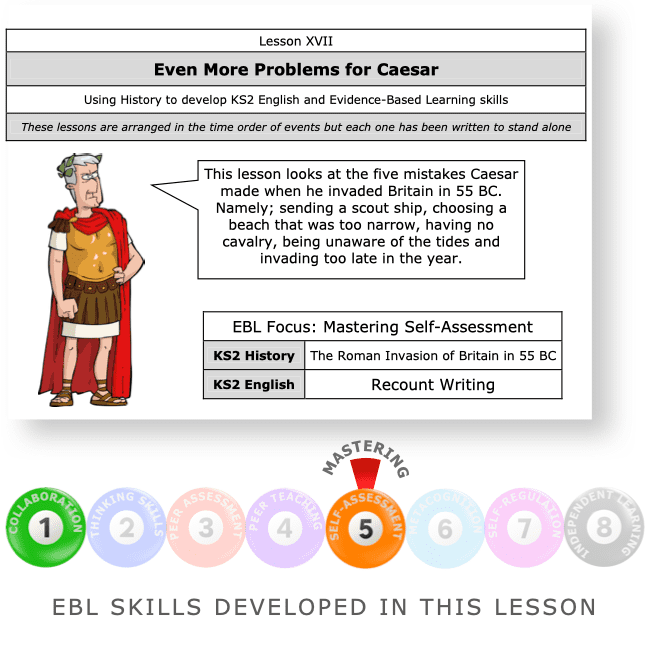 £3.00Add to basket
£3.00Add to basketThis lesson looks at the five mistakes Caesar made when he invaded Britain in 55 BC. Namely; sending a scout ship, choosing a beach that was too narrow, having no cavalry, being unaware of the tides and invading too late in the year.
As well as English (writing a recount) and history skills the Evidence-Based Learning skills developed in this lesson includes collaborative learning. This lesson also offers pupils the opportunity to master self-assessment.
VIEW -

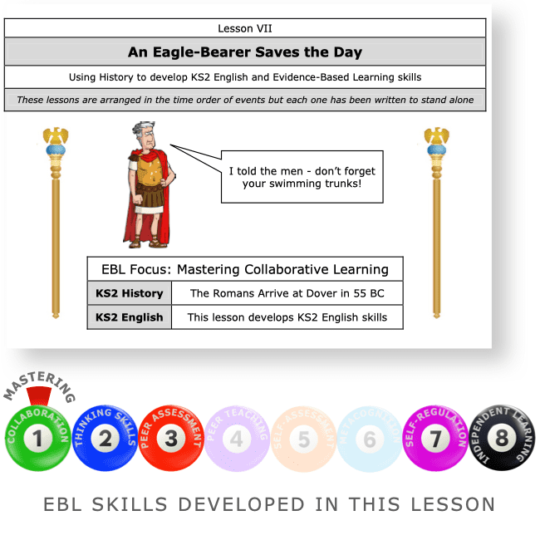
An Eagle-Bearer Saves the Day
£3.00 Add to basket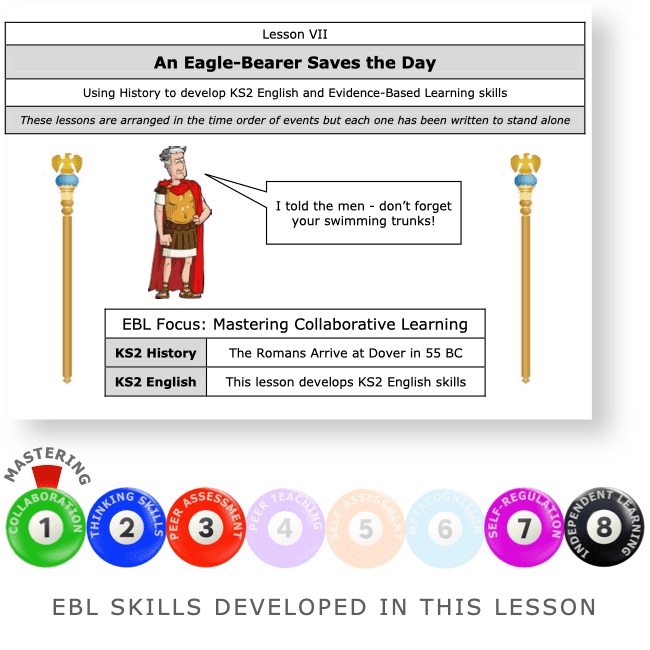 £3.00Add to basket
£3.00Add to basketJulius Caesar has just crossed the English Channel to invade Britain in 55 BC. He had to find another beach to land his soldiers on as the first beach that he sailed to (Dover) had fierce Britons waiting on the cliff tops and was too narrow.
When his ships arrived at the next beach, they could not get close to the shore, so he ordered his men to jump off the ships into the sea and wade ashore. When the order to jump was given, the men refused to jump. However, one soldier, an eagle-bearer, encouraged the others to jump in after him – and they did. Without him, the invasion might not have taken place.
As well as English and history skills the Evidence-Based Learning skills developed in this lesson include independent learning, thinking skills and self-regulation. This lesson also offers pupils the opportunity to master collaborative learning.
VIEW -

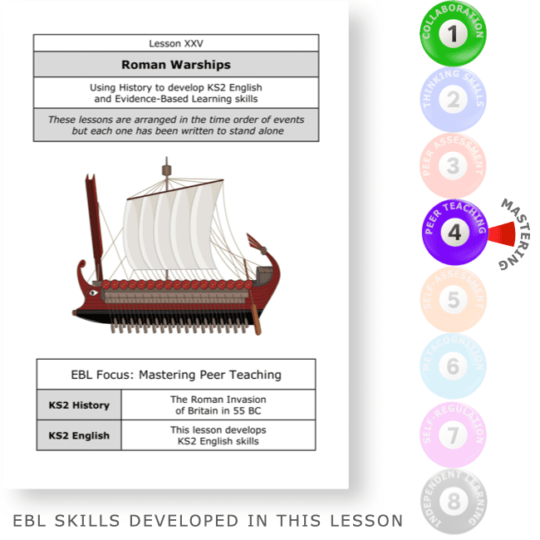
Roman Warships
£3.00 Add to basket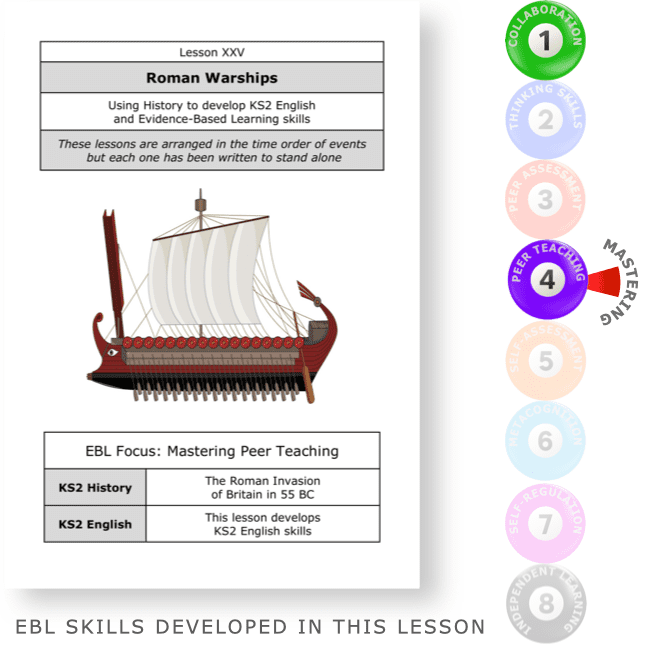 £3.00Add to basket
£3.00Add to basketThis lesson looks at the warships, especially the triremes, used by the Romans in their invasion of Britain in 55 BC. It also considers the fact that the Romans were brilliant copycats.
As well as English and history skills the Evidence-Based Learning skills developed in this lesson includes collaborative learning. This lesson also offers pupils the opportunity to master peer teaching.
VIEW

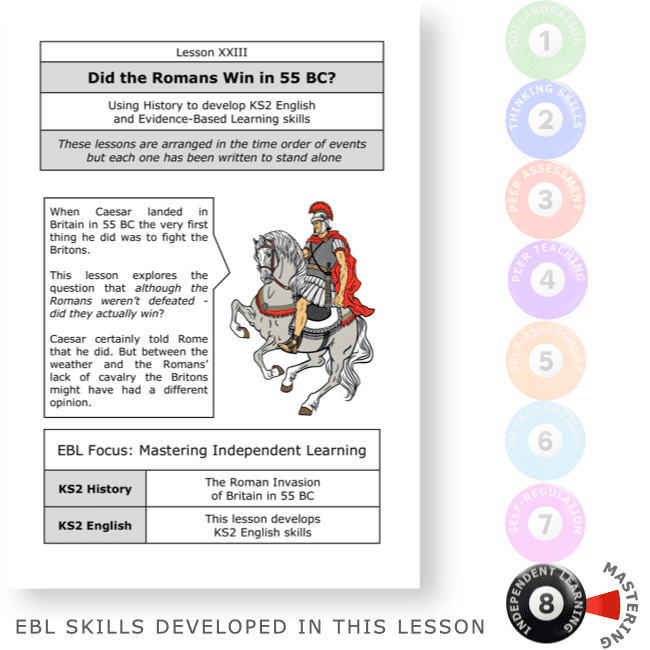

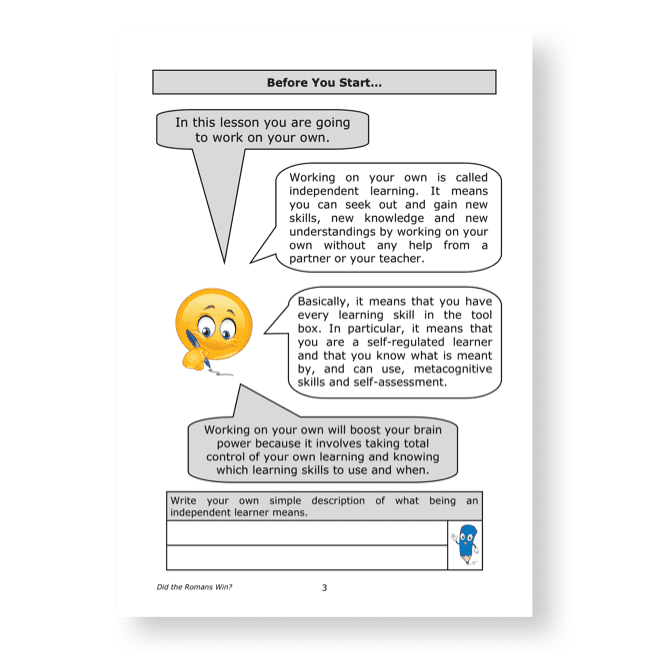
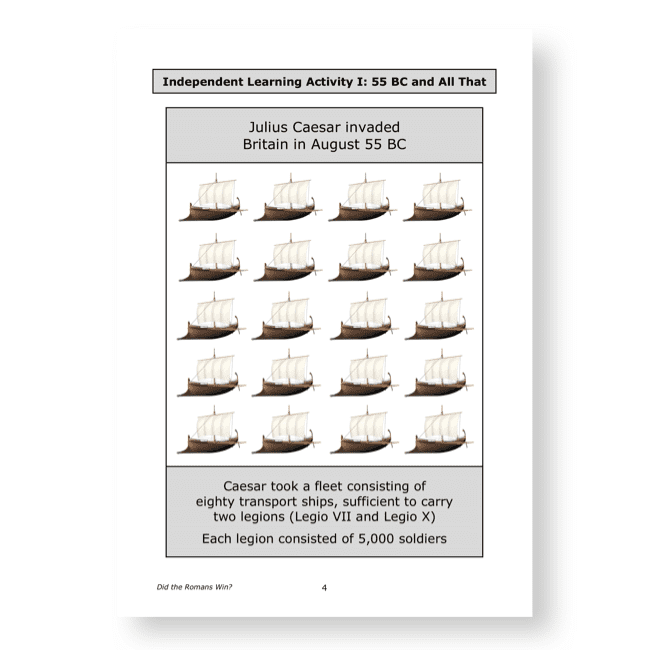
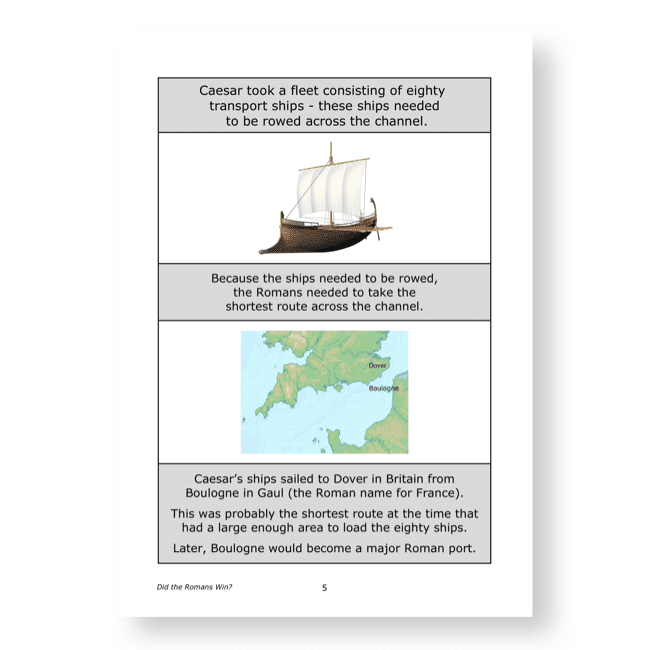
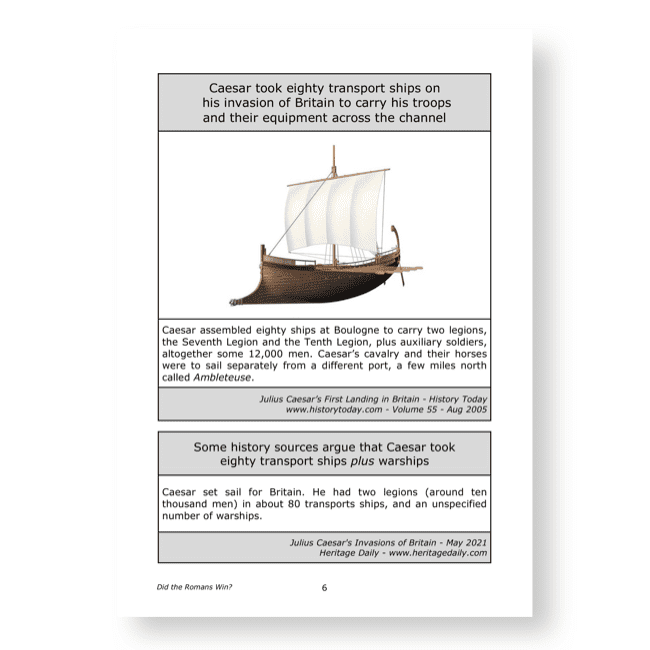
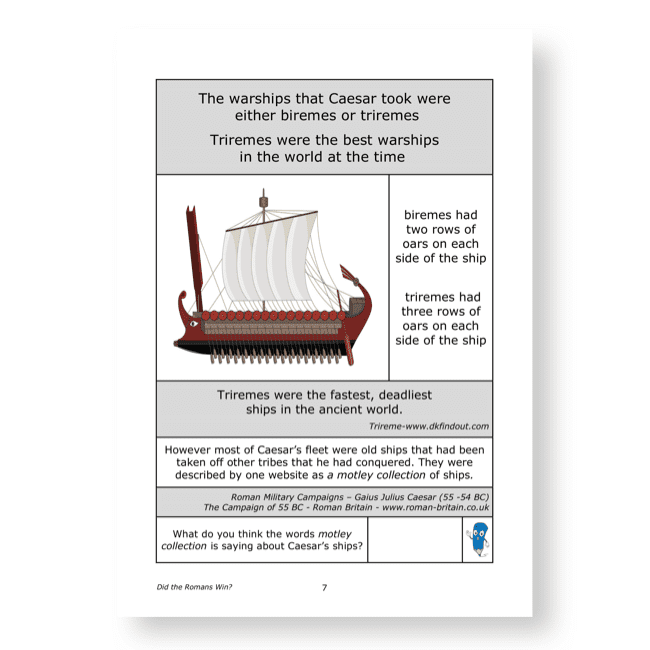
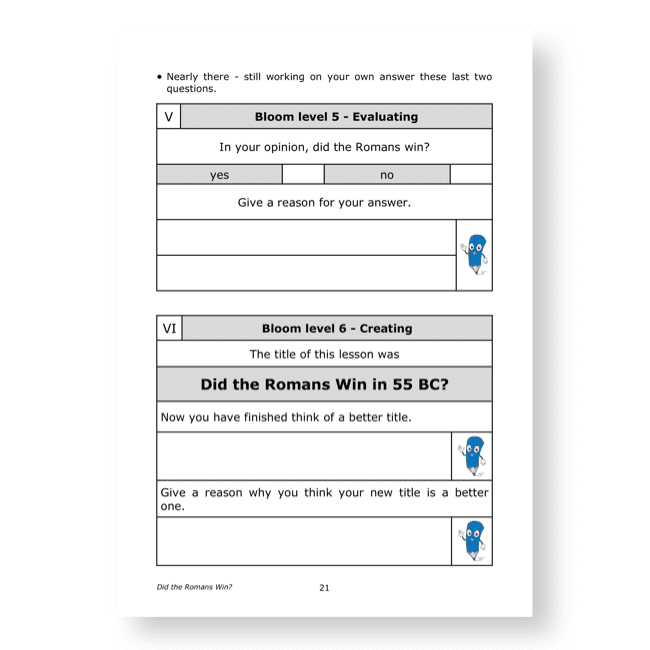
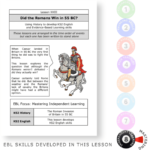
Philipem (verified owner) –
We asked a.i. to review this lesson. This is what it said:
Explore Caesar’s Invasion with This Thought-Provoking Roman Lesson
Looking for a way to get your upper KS2 students thinking critically about the Romans while developing valuable literacy and independent learning skills? Check out the lesson “Did the Romans Win in 55 BC?” from the Romans series.
This engaging lesson takes students back to 55 BC when Julius Caesar first invaded Britain. Despite fighting successful battles against the Britons, the question is raised – did the Romans actually win the invasion attempt? Between the poor weather conditions, lack of cavalry support, and Britons’ resilience, students are prompted to evaluate the outcomes from multiple perspectives.
By working through the background information and designing a summary poster, students will:
– Learn key details about Caesar’s invasion forces, tactics, and the sequence of events
– Practice summarising historical information in a concise, structured format
– Develop the valuable skill of independent learning by completing the poster activity without support
The Evidence-Based Learning focus on independent learning skills is perfectly embedded, allowing students to take full ownership of their work. Each lesson highlights one specific EBL technique to gradually build students’ abilities.
Whether you’re teaching upper KS2 History, English, or an integrated topic, this thought-provoking Roman lesson is sure to spark lively discussions and critical thinking practice. Use it to put your students’ evidence-analysis abilities to the test!
Rating: ⭐⭐⭐⭐⭐ (5/5 stars)